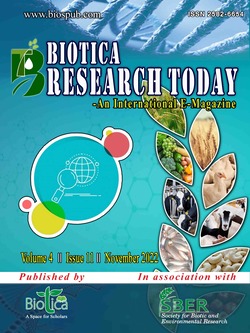
Nanoformulated Essential Oils for Enhanced Pest Management
Ankush S. Gadge*
Division of Agricultural Entomology, ICAR-Directorate of Onion and Garlic Research, Rajgurunagar, Pune, Maharashtra (410 505), India
Pushpalatha M.
Dept. of Entomology, Mahatma Phule Krishi Vidyapeeth, Rahuri, Maharashtra (413 722), India
Durgesh K. Narwade
Dept. of Entomology, Mahatma Phule Krishi Vidyapeeth, Rahuri, Maharashtra (413 722), India
Dhananjay V. Shirsat
Division of Agricultural Entomology, ICAR-Directorate of Onion and Garlic Research, Rajgurunagar, Pune, Maharashtra (410 505), India
Vanitha Khandibagur
Dept. of Entomology, College of Horticulture, Bagalkote, Karnataka (587 104), India
DOI: NIL
Keywords: Essential oil, Insect, Management, Nanoformulation
Abstract
Plant essential oils which exhibit toxic, repellent, and antifeedant effects on different insect species are used to control insects over the years; however, the difficulty in applying essential oils on a large-scale and their efficacy under environmental conditions needs to be enhanced. The development of nanoformulated essential oils (NEO) showed promise in enhancing the efficacy, increased stability, and prevented rapid degradation of active compounds. In addition, nanoencapsulated oils have higher mobility and better penetrating ability into insect tissues. Incorporation of essential oils into controlled-release nanoformulations may contribute to solve the problems associated with their application, stability, and feasibility in pest management. Essential oils have an advantage over chemical insecticides in reducing adverse effects on human health and the environment and at the same time with their increased efficacy can increase horticultural crop productivity and yield.
Downloads
not found
Reference
Anjali, C.H., Sharma, Y., Mukherjee, A., Chandrasekaran, N., 2012. Neem oil (Azadirachta indica) nanoemulsion - a potent larvicidal agent against Culex quinquefasciatus. Pest Management Science 68(2), 158-163.
Ibrahim, S.S., 2019. Essential oil nanoformulations as a novel method for insect pest control in horticulture. In: Horticultural Crops. (Eds.) Baimey, H.K., Hamamouch, N., Kolombia, Y.A. IntechOpen. pp. 195-209. DOI: https://doi.org/10.5772/intechopen.73771.
Isman, M.B., 2019. Commercial development of plant essential oils and their constituents as active ingredients in bioinsecticides. Phytochemistry Reviews 19(2), 235-241.
